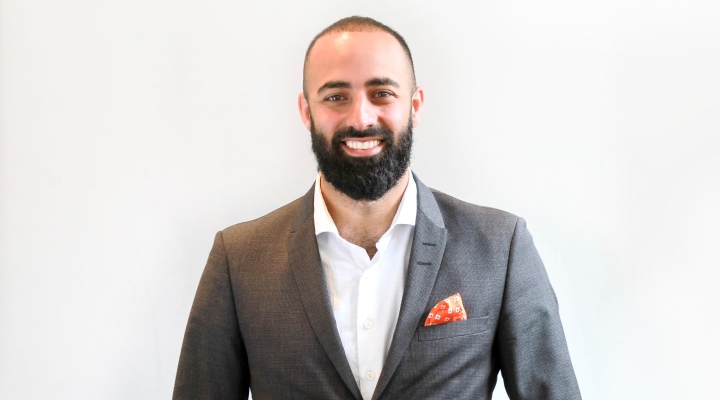Mohamad Sawwaf is the CEO of Manzil in Toronto, Canada. The firm is dedicated to helping clients achieve both short-term and long-term financial goals through its unique alternative mortgage lending platform. While focused on the principles of Islamic finance, the service is open to Muslims and non-Muslims alike.
Mohamad Sawwaf has over 10 years in the financial services arena, going straight into it after his undergraduate program. He obtained his MBA from the Rotman School of Business and is currently half-way through his doctorate focused on Islamic finance.
Manzil came into being as a result of research to answer one repeated question Mohamad Sawwaf heard over and over again. The question; “What financial products and/or services are available that are in line with our religious principles?” The answer at the time was simply “none”. Mohamad started doing his homework to create a solution to fill that need and gap in the market.
When Mohamad Sawwaf is not working, he spends as much time as possible with his wife and two boys. He also reads a lot, but it is more through the internet than physical books.
How did you get started with Manzil and what inspired you to do so?
While I was the teaching assistant for the Islamic Finance Course at the business school, there was always this question of who is actively practicing Islamic finance and where can it be found in Canada? It was non-existent basically. Although great efforts are being made with it, not all of them are compliant. I was willing to take the risk and see how far I could go with it and try to fill a gap.
How does Manzil make money?
There are two areas of the business. One is lender/broker fees; the costs to taking on a mortgage because we are in the private lending space. We also manage a pool of capital for investors, so we charge a management fee on that.
How long did it take for you to become profitable?
Everything is ready to go, we are in the final stages of securing capital right now to execute our model. We are very pleased to be moving ahead.
When you first decided to start Manzil, was there a time that you doubted this was going to work? If so, how did you handle it?
There may have been some times when I doubted it, based on conversations with different investors. The questions about “Is there a true market and how big is it?” Or “Why are you or your product better than what’s out there?” I convinced them that once people were aware of this there would be a greater need to be more in line with religious principles.
How did you find your first customer?
Basically by word-of-mouth. I shared it with a few friends and it just spread. There have even been some folks from the Middle East with families here asking about it.
What is one marketing strategy beyond referrals that you’ve started using that is generating new business for you?
I hold information sessions at mosques, universities, and other community organizations, and also host some at our office. I explain how Islamic finance works, how it’s different from conventional methods and the compliancy aspect of it.
What is the toughest decision you’ve had to make in business in the last few months?
Probably when it comes to raising money. Saying no when there’s a deal on the table, because it’s not a good one for whatever reason. It’s tough because you don’t know who else is willing to give you money, or where it will come from next.
What do you think makes you successful?
Just sheer persistence, following up with everyone with interest in the organization and field. When something needs to be done, my team and I are really good at execution in a timely manner. There’s no time to waste, so we get things done quickly.
What have you found to be the most satisfying moment since you’ve started Manzil?
When people let me know that they’re happy that something has come around. They’ve been waiting for so long and it’s finally coming true. At the end of the day, it’s the feel-good stories that I’ve heard as a result of the business that satisfy me.
What does the future hold for Manzil, and what are you most excited about?
Creating a space. In this very diverse, multi-everything city, the goal is to create Toronto as the Islamic Finance Hub of North America. We’re not the only players in this space, but I expect us to lead it with innovative and new products; investments, credit cards, and personal loans will be coming in the future.
What business books have inspired you?
They would be in the personal finance area. ‘Think and Grow Rich’ by Napoleon Hill. Another one would be ‘Rich Dad Poor Dad’ by Robert Kiyosaki. They helped me understand people and diversion. ‘Blue Ocean’ by W. Chan Kim and Renée Mauborgne inspired me to not jump into an already saturated market. It kept me looking through a different lens with better focus.
What is one recent purchase you’ve made to help with Manzil?
Different devices like my MacBook Pro and Apple Watch because I work on the go a lot. I’m constantly responding to emails or on the phone and items like these keep me productive and help manage my time.
What is the difference between Islamic finance and conventional finance?
Using steaks as an example; two steaks that are exactly the same. Now I ask you which one is Halal? You wouldn’t be able to tell me because the difference is in the preparation, how one got there. With Islamic finance, the outcome may look the same, the product is the same, but it’s how one got there that makes all the difference.

